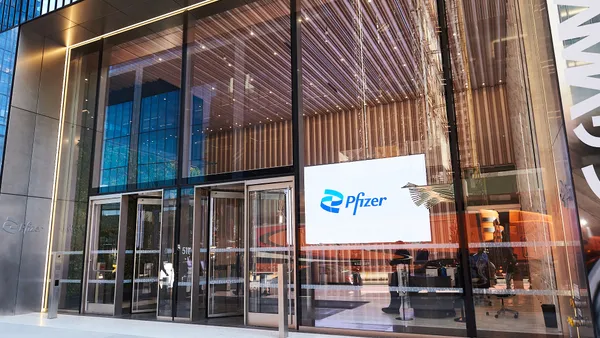Compass Healthcare Communications
In May, Compass Healthcare Communications gathered together some of the Mobile Marketing industry’s leading authorities to participate in its Innovation Lab Series. The Series provides insight and guidance about emerging marketing trends and how to successfully apply them. More than a passive “sit and listen" meeting, it is an engaging and interactive session from which attendees emerge smarter and armed with marketing solutions for their company or brand(s).
The first part of the day was led by a panel of experts in the mobile media space including: n Ethan Ross, Vice President of Sales, Millennial Media n Michele Bennett, Managing Partner, Mobile Tag Company n Sandeep Shah, President and CEO, Skyscape (now Physicians Interactive) n Eugene Lee, Executive Director of Media Development, CMI During the second part of the day, attendees and panelists worked together to develop mobile marketing solutions to real marketing opportunities offered by the attendees. Mobile Stats — Why As a Marketer You Should be Interested Mobile devices and use are growing and should be a dominant medium within the next 10 years. n 90% of Americans use cell phones with 20% adopting smartphones1 n 74 million U.S. users (26% of all mobile phone users) access the Internet via their phones2 n +81% estimated growth of Mobile Internet users from 2009-2013 (74M à 134M)2 n There are 3 times as many web enabled phones as there are PCs. (3.4B active mobile devices vs.1.0B active PCs) with more people accessing the Internet on mobile phones than on PCs.3 Mobile applications can complement or enhance a brand’s other traditional media programs (print, billboard, television spot, radio or Web) with a mobile call-to-action such as a mobile ad, link to a site, video, applications, a keyword QR code and short code. Like social media, Mobile has changed control of the message. A brand’s message is “no longer delivered top down", observed Eugene Lee. The user now controls the message by determining what they want to consume, “including when and where they want to consume it." As Michelle Bennett noted, “Mobile devices are quite personal to their users — it’s part of people’s daily life — an appendage." And for the most part, consumers are connected to their devices 24 hours per day. The mobile phone is a personal extension of its owner. “Super relevant and meaningful communications are not only expected, but demanded by this audience." This audience responds to ads differently and has a lower tolerance of ads and communications that are not fully resonate with their needs. “With higher targetability comes higher risk," warned Ms. Bennett. And the technology has advanced to support the incorporation of fair balance in mobile ads. Millennial Media is poised to launch three separate campaigns for the pharmaceutical industry with an expandable iPhone unit that gives room for Fair Balance. Mobile vs. Other Mediums “People are into ‘big pictures’ not small text," remarked Ethan Ross. As mobile marketers, “we need to ensure we conform the message to the vehicle — take advantage and recognize the challenges of the smaller screen." Additionally, communication and ads within the mobile realm need to match the expectation of the device (e.g., the recent Docker’s campaign that allowed the “shake" feature to move the communication forward). Where we acquire trusted information has changed. As a result, our thinking on how we deliver information must also change. The ability to target specific groups of individuals is greater than it has ever has been. This makes it possible to provide customized messages with increased relevance like never before. For example, Mr. Ross shared how Millennial Media used competitive targeting in the cell carrier vertical. They were able to target those handsets they knew were old and thus the users’ contracts would be coming up on expiration. In addition, to further refine the target, they utilized a questionnaire to determine if the cell phone contract was going to expire in 3 months. If so, they would drop a cookie and retarget them with offers to sign with another carrier. Mobile consumers are generally either looking for ways to save time or ways to kill time.4 Because a mobile phone is such a personal device, consumers’ mindsets are completely different on the mobile Web than they are on the wired Web. While consumers accessing the wired Web at home or in their office often browse for extended periods of time, on mobile they tend to seek snack-size information or entertainment content such as: n Breaking news headlines n Weather updates n Sports scores n Image galleries n Television and movie schedules n Alerts n Database references n Short-form video content Adoption in Pharma will be Driven by HCPs vs. Consumers: Mobile marketing is a “young" technology for our industry with few significant widespread uses available for the next 2-4 years. However there are some very promising applications for specific conditions and situations. The mobile marketing medium, unlike the other “new" marketing tactics in pharma, is going to be driven by HCP audiences. Already, 64% of all HCPs have a smart phone; that figure climbs to 79% for HCPs under the age of 45.5 And 100% of all residents have one. HCPs consume information from sources that they trust. Historically, these sources have been “places." The trend over many years has moved the use/consumption of information from “place" to “person" with digital communications truly creating exponential growth in the convenience of receiving information at the point of need. The Ultimate RM Marketing Tool Mobile’s ability to provide superior targeting beyond age and gender, to include location, time of day and day of week, and to facilitate two-way communication between advertisers and consumers, makes it one of the main reasons that mobile is now. Not only does Mobile have a ubiquitous presence — with us 24/7 — it can also reach more people, more efficiently, and with greater targetability By building relationships via timely, relevant and valuable interactive conversations, Mobile can form the basis for strong long-term relationships. n Note: *The Innovation Lab informative and collaborative workshop event series provides insight and guidance about emerging marketing trends and how to successfully apply them. More than passive “sit and listen" sessions, these are engaging and interactive events from which attendees emerge smarter and armed with real marketing solutions for their company or brand(s). Our next event in the series will focus on HCP Relationship Marketing. To find out more go to compassinnovates.com Source: 1. FierceWireless , 2009; 2. eMarketer, 2009; 3. Mobile Marketer, 2009; 4. Mobile Marketer, 2009; 5. Manhattan Research Peter H. Nalen President Compass Healthcare Communications, focused on specialty healthcare, is a leading interactive and relationship marketing agency. For more information, visit compasshc.com. Mobile’s ability to provide superior targeting beyond age and gender, to include location, time of day and day of week, and to facilitate two-way communication between advertisers and consumers, makes it one of the main reasons that mobile is now.











